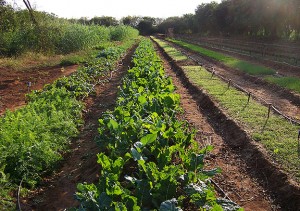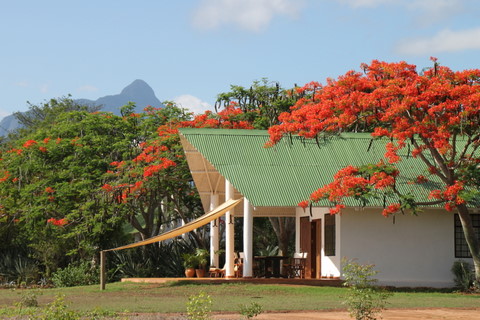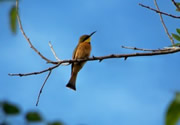Organic Farming and Conservation
Organic farming aims at providing healthy food while preserving the environment. Long term sustainability and biodiversity are achieved by crop rotation, green manuring, composting, biological pest control and the preservation of ecological zones within the farm. Chemical inputs are not allowed and off-farm inputs in general are restricted.

Seedbeds and vegetable garden on Mbuyuni Farm 2009.
On Mbuyuni Farm we prepare 1-200 tons of compost every year by mixing our farm residues (mainly moringa stems) with cattle manure (from neighbouring Masaai kraals), sunflower cake and wood ashes. After 6-9 months the mature compost is distributed to the fields which are to be planted with cash crops that season. The other fields lie fallow or are planted with green manure. Over the years we have experienced an increase in yields due to the improvement of our soil productivity.
Despite tropical conditions the pest pressure has been limited on both farms due to a strict crop rotation and relatively small fields separated from each other by hedges and bush strips. In case the pressure becomes too big we use natural pyrthrum and neem products. Copper is also allowed in limited quantities against fungal diseases.
Organic agricultural methods are internationally regulated and legally enforced by many countries. Certification of an organic farm depends on an annual inspection by authorised control bodies.
Kimango Farms have been inspected and certified since 1993 by the Swiss Institute of Market Ecology (IMO) and since 2018 by Ecocert. Both farms and all our products are certified according to European Union and US (NOP) regulations, and approved by the Swiss standard BioSuisse.
The modern organic movement began in the 1920’s, but only since the 1980’s has organic farming gained in size and popularity. Nevertheless, even today less than 1% of the world food production is certified organic.
We believe that only organic farming can ensure a sustainable land use in the long term future. And farming practices must be part of a broader approach that includes environmental conservation, including tree
planting, ecological buffer zones etc.. On Kimango Farms the less productive areas have been preserved as natural bush and other areas have been reforested with indigenous trees as well as plantation trees. Farming must be in balance with an intact environment.



